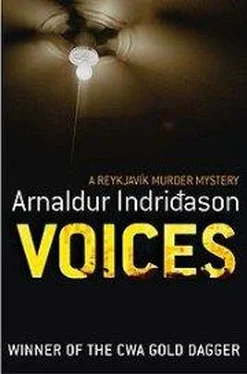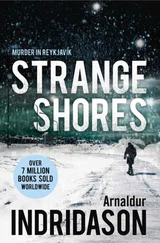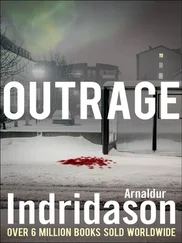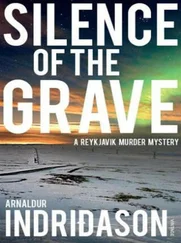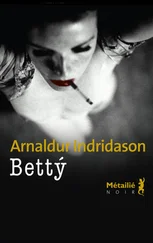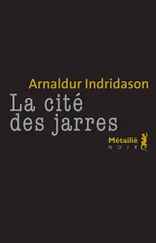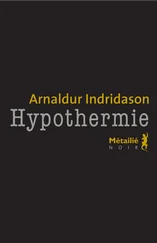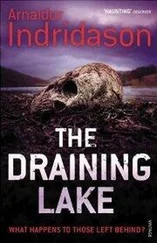They did not see him come down to the dining room where they were eating, and talked about how he might have ordered a meal by room service. Valgerdur mentioned that he looked tired.
Erlendur had accompanied her to the cloakroom and helped her put on her smart leather coat, then walked with her to the revolving doors where they stood for a moment before she went out into the falling snow. When he lay on his bed, after Eva Lind had left, Valgerdur’s smile accompanied him into sleep, along with the faint scent of perfume that lingered on his hand from when they had said their goodbyes.
“Erlendur?” Sigurdur Oli said. “Hello! Wapshott, who is he?”
“All I know is that he’s a British record collector,” Erlendur said, after telling them about his meeting with him. “And he’s leaving the hotel tomorrow. You ought to phone the UK and get some details on him. We’re going to meet before noon and I’ll get some more out of him.”
“A choirboy?” Elinborg said. “Who could have wanted to kill a choirboy?”
“Naturally, he wasn’t a choirboy any longer,” Sigurdur Oli said.
“He was famous once,” Erlendur said. “Released some records that are clearly rare collectors” items today. Henry Wapshott comes up here from the UK on account of them, on account of him. He specialises in choirboys and boys” choirs from all over the world.”
“The only one I’ve heard of is the Vienna Boys” Choir,” Sigurdur Oli said.
“Specialises in choirboys” Elinborg said. “What kind of man collects records of choirboys? Shouldn’t we give that some thought? Isn’t there something odd about that?”
Erlendur and Sigurdur Oli looked at her.
“What do you mean?” Erlendur asked.
“What?” Elinborg’s expression turned to one of astonishment.
“Do you think there’s something odd about collecting records?”
“Not records, but choirboys,” Elinborg said. “Recordings of choirboys. There’s a huge difference there, I reckon. Don’t you see anything pervy about that?” She looked at them both in turn.
“I haven’t got a dirty mind like you,” Sigurdur Oli said, looking at Erlendur.
“Dirty mind! Did I imagine seeing Santa Claus with his trousers down in a little basement room and a condom on his willy? Did I need a dirty mind for that? Then a man who worships Santa, but only when he was twelve years old or so, just so happens to be staying at the same hotel and comes over from the UK to meet him? Are you two plugged in?”
“Are you putting this in a sexual context?” Erlendur asked.
Elinborg rolled her eyes.
“You’re like a couple of monks!”
“He’s just a record collector,” Sigurdur Oli said. “As Erlendur said, some people collect airline sick bags. What’s their sex life like, according to your theories?”
“I can’t believe how blind you two are! Or frustrated. Why are men always so frustrated?”
“Oh, don’t you start,” Sigurdur Oli said. “Why do women always talk about how frustrated men are? As if women aren’t frustrated with all their stuff, “Oh, I can’t find my lipstick”…”
“Blind, frustrated old monks,” Elinborg said.
“What does being a collector mean?” Erlendur asked. “Why do people collect certain objects to have around them and why do they see one item as being more valuable than others?”
“Some items are more valuable than others,” Sigurdur Oli said.
“They must be looking for something unique,” Erlendur said. “Something no one else has. Isn’t that the ultimate goal? Owning a treasure that no one else in the whole wide world has?”
“Aren’t they often pretty strange characters?” Elinborg said.
“Strange?”
“Loners. Aren’t they? Weirdos?”
“You found some records in Gudlaugur’s cupboard,” Erlendur said to her. “What did you do with them? Did you look at them at all?”
“I just saw them in the cupboard,” Elinborg said. “Didn’t touch them and they’re still there if you want to take a look.”
“How does a collector like Wapshott make contact with a man like Gudlaugur?” Elinborg continued. “How did he hear about him? Are there intermediaries? What does he know about recordings of Icelandic choirboys in the 1960s? A boy soloist singing up here in Iceland more than thirty years ago?”
“Magazines?” Sigurdur Oli suggested. “The Internet? Over the phone? Through other collectors?”
“Do we know anything else about Gudlaugur?” Erlendur asked.
“He had a sister,” Sigurdur Oli said. “And a father who’s still alive. They were informed of his death, of course. The sister identified him.”
“We should definitely take a saliva sample from Wapshott,” Elinborg said.
“Yes, I’ll see to that,” Erlendur said.
Sigurdur Oli began gathering information about Henry Wapshott; Elinborg undertook to arrange a meeting with Gudlaugur’s father and sister, and Erlendur headed down to the doorman’s room in the basement. Walking past reception, he remembered that he still had to talk to the manager about his absence from work. He decided to do it later.
He found the records in Gudlaugur’s cupboard. Two singles. One sleeve read: Gudlaugur sings Schubert’s “Ave Maria”. It was the same record that Henry Wapshott had shown him. The other showed the boy standing in front of a small choir. The choirmaster, a young man, stood to one side. Gudlaugur Egilsson sings solo was printed in large letters across the sleeve.
On the back was a brief account of the child prodigy.
Gudlaugur Egilsson has commanded much-deserved attention with Hafnarfjordur Children’s Choir and this twelve-year-old singer definitely has a bright future ahead. On his second recording he sings with unique expression in his beautiful boy soprano under the direction of Gabriel Hermannsson, choirmaster of Hafnarfjordur Children’s Choir. This record is a must for all lovers of good music. Gudlaugur Egilsson proves beyond all doubt that he is a singer in a class of his own. He is currently preparing for a tour of Scandinavia.
A child star, Erlendur thought as he looked at the film poster for The Little Princess with Shirley Temple. What are you doing here? he asked the poster. Why did he keep you?
He took out his mobile.
“Marion,” he said when the call was answered.
“Is that you, Erlendur?”
“Anything new?”
“Did you know that Gudlaugur made song recordings when he was a child?”
“I’ve just found that out,” Erlendur said.
“The record company went bankrupt about twenty years ago and there’s not a trace of it left. A man by the name of Gunnar Hansson owned and ran it. The name was GH Records. He released a bit of hippy stuff but it all went down the plughole.”
“Do you know what happened to the stock?”
“The stock?” Marion Briem said.
“The records.”
“They must have gone towards paying off his debts. Isn’t that usually the case? I spoke to his family, two sons. The company never released much and I drew a total blank at first when I asked about it. The sons hadn’t heard it mentioned for decades. Gunnar died in the mid-eighties and all he left behind was a trail of debts.”
“There’s a man staying here at the hotel who collects choral music, choirboys. He was planning to meet Gudlaugur but nothing came of it. I was wondering whether his records might be worth something. How can I find out?”
“Find some collectors and talk to them,” Marion said. “Do you want me to?”
“Then there’s another thing. Could you locate a man called Gabriel Hermannsson who was a choirmaster in Hafnarfjordur in the sixties? You’re bound to find him in the phone directory if he’s still alive. He may have taught Gudlaugur. I’ve got a record sleeve here, there’s a photo of him and he looks to me as if he was in his twenties then. Of course, if he’s dead then it stops there.”
Читать дальше
